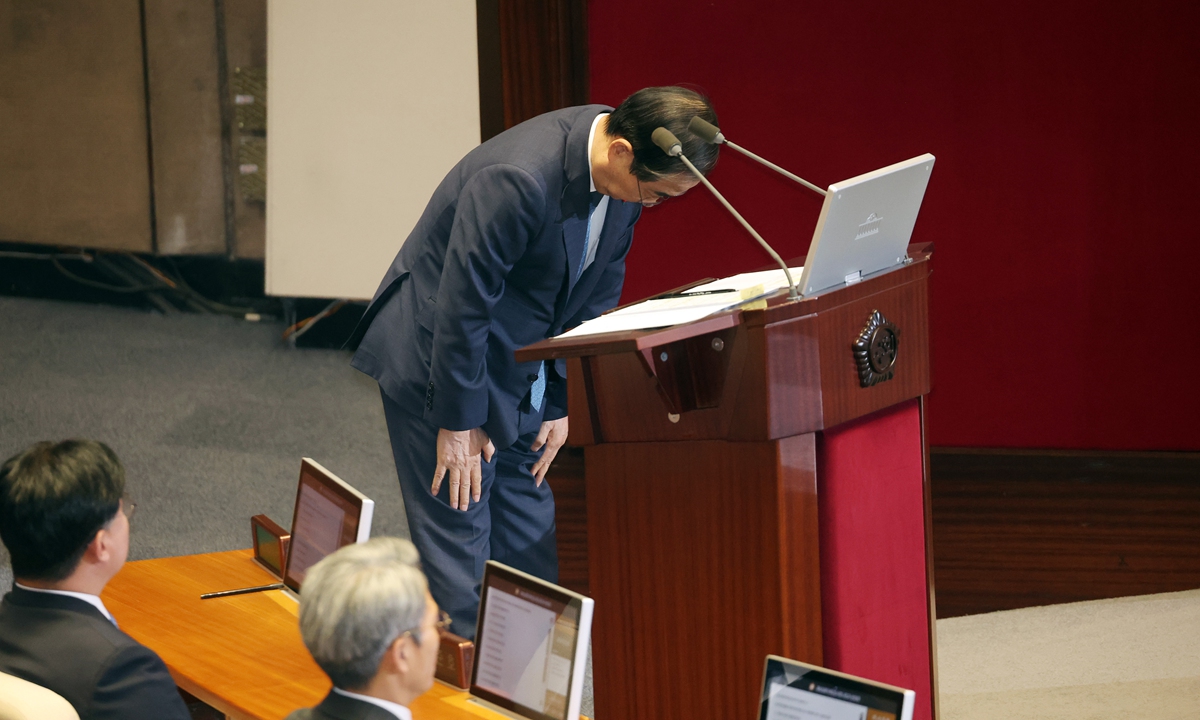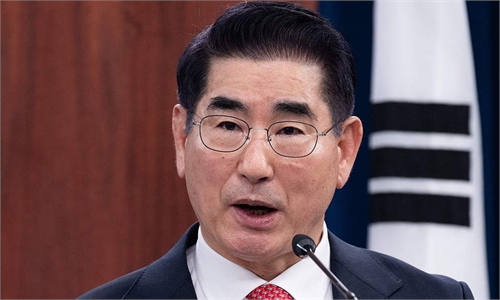Political turmoil in SK spreads amid suicide attempt, joint investigation
Intensive operations show political wrestling ‘white-hot’: observer

South Korean Prime Minister Han Duck-soo issues an apology in parliament regarding the December 3 martial law declaration on December 11, 2024, Seoul. Photo: VCG
Wednesday saw some major development in South Korea's ongoing turmoil. Former defense minister Kim Yong-hyun attempted to commit suicide while being held at a detention facility on charges of insurrection, police raided the presidential office along with other locations, and the police, the Corruption Investigation Office for High-ranking Officials (CIO) and military will launch a joint investigation team over President Yoon Suk-yeol's treason charge, according to Yonhap News Agency.
Kim was found trying to hang himself with a rope made from tying together innerwear inside a bathroom at the Seoul Dongbu Detention Center in eastern Seoul at 11:52 pm. Tuesday, shortly before a court issued a warrant to arrest him, the justice ministry said.
Kim was formally arrested early Wednesday on charges of helping Yoon stage an insurrection through his short-lived imposition of martial law last week.
By law, those who participate in plotting an insurrection are punishable by death, life imprisonment or a prison term of at least five years, Yonhap reported.
Dramatic moment
Kim's suicide attempt constitutes a latest dramatic moment as the country's political turmoil spreads, and may evoke some memories of life-and-death situations in the country's constitutional history, said a Chinese expert.
Kim's post as defense chief means he should have involved deeply into the imposition of the martial law, including communication with Yoon through the process and deployment of soldiers, and the punishment could be severe, he said.
Prosecutors suspect the then defense minister proposed the declaration of martial law to Yoon and ordered the deployment of troops to the National Assembly compound and the National Election Commission headquarters, Yonhap reported.
The Chinese expert said Kim has the knowledge of not only the martial law turmoil itself, but also more military-related information and the decision-making processes of the Yoon administration.
Da Zhigang, director of the Institute of Northeast Asian Studies at Heilongjiang Provincial Academy of Social Sciences, told the Global Times that the turmoil has evolved too wide and involved too many people, also prompted too strong public sentiments that investigations will not be affected by any single person's destiny.
Probe speeds up
With Kim's formal arrest, the prosecution's investigation into Yoon's insurrection charges is expected to pick up pace. Yoon has been booked as a suspect and barred from traveling overseas.
The head of the CIO Oh Dong-woon claimed Wednesday to have "plenty of will" to arrest President Yoon, when he was pressed by a lawmaker on whether he has the "will" to do so.
Police raided multiple locations, including the presidential office early Wednesday. Yoon was reportedly not inside the presidential office building when investigators arrived to gather material related to his imposition of martial law.
The presidential office later said it does not possess the gist of remarks by participants at a Cabinet meeting that took place right before last week's martial law declaration, adding the gathering lasted for just five minutes, Yonhap reported.
Prime Minister Han Duck-soo apologized Wednesday over Yoon's declaration of martial law last week, saying he voiced "clear" opposition to the plan.
Some analysts believed that different departments - including the prosecutors, police and the CIO - are propelled to "act actively" over the martial law-caused turmoil as they are "competing to fulfill their due duty" so as to maintain presence in the complicated investigation, and they also fear repercussions for "not acting" after the turmoil finally subsides.
Political wrestling
Former President Moon Jae-in said Wednesday his successor Yoon cannot avoid impeachment, noting the urgent need for a "legitimate" acting head of state to conduct diplomacy and control the military, Yonhap reported.
Moon made the remarks on his Facebook page amid growing calls for President Yoon's ouster after a parliamentary impeachment vote failed on December 7.
Moon said it was "urgent" to have a legitimate acting president, citing the need to have a figure to conduct summit diplomacy and saying it would not be possible to normally control the military in the event of a security crisis.
The National Assembly is expected to impeach Yoon again on Saturday. The main opposition is expected to reintroduce the impeachment bill Thursday.
The political landscape has drastically changed since last impeachment in favor of impeaching the president, as public outrage and mounting pressure against the ruling party have grown. Analysts now say that it is increasingly unlikely that People Power Party (PPP) lawmakers, who hold the decisive votes for the motion, will stage another boycott, according to Yonhap.
The actions of different parties, the chaotic and sometimes conflicting messages, and Moon's remarks, underscored the white-hot political wrestling in South Korea at the moment, Da said.

